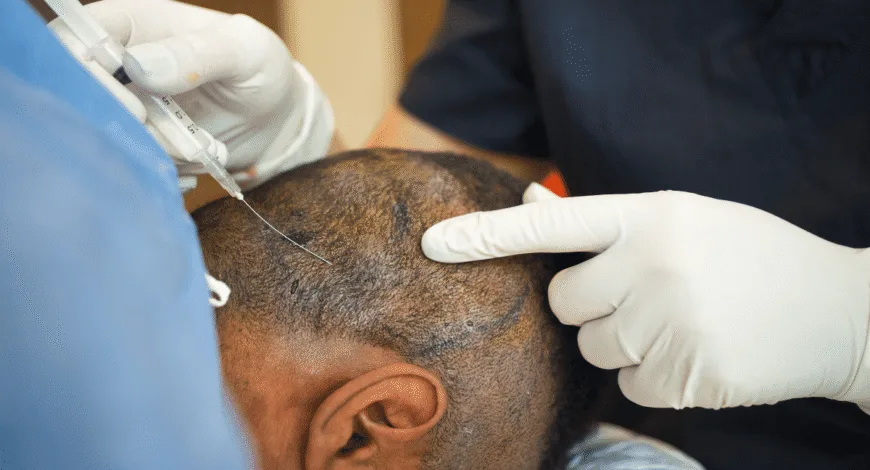In a world leaning towards organic and holistic solutions, the allure of “all-natural” hair growth products is powerful. Bottles infused with saw palmetto, rosemary oil, and pumpkin seed extract promise a gentle, chemical-free path to a fuller head of hair.
But when you’re facing real, progressive hair loss, a critical question arises: Are these natural products actually safer or better than proven medical treatments?
The Short Answer: While generally safe for topical use, “all-natural” products are not better or more effective for treating genetic hair loss (Androgenetic Alopecia) than FDA-approved medications or a hair transplant. Their potency is significantly lower, and their results are not supported by the same level of rigorous clinical evidence.
At Luxe Hair Transplant Center, we are committed to providing clear, evidence-based guidance. Let’s break down the science behind natural products versus clinical solutions.
Understanding Popular Natural Ingredients: Hope vs. Hype
Many natural ingredients do have a theoretical basis for helping with hair. Here’s a quick look at the most common ones:
-
Saw Palmetto: This is perhaps the most famous natural ingredient. It’s believed to work by mildly inhibiting the enzyme 5-alpha-reductase, which converts testosterone to DHT (the primary hormone responsible for male pattern baldness).
-
Pumpkin Seed Oil: Similar to saw palmetto, some studies suggest it may have a mild DHT-blocking effect.
-
Rosemary Oil: One study famously compared it to 2% minoxidil, finding similar results after six months. It is thought to work by improving circulation to the scalp.
The Reality Check: The key words here are “mildly,” “suggest,” and “one study.” While promising, these ingredients lack the potency and the vast body of large-scale, double-blind clinical trials that support FDA-approved treatments. They are a whisper compared to the authoritative voice of clinical medicine.
The Big Question: “Safer” or “Better”?
Let’s tackle this head-on by breaking it into two parts.
1. Are They Safer?
For the most part, high-quality natural oils and extracts are safe for topical use. However, the term “natural” does not automatically mean “zero risk.”
-
Allergic Reactions: You can be allergic to any plant-based ingredient, leading to contact dermatitis, itching, and redness, which can worsen scalp health.
-
Lack of Regulation: The supplement and cosmetics industry is not as strictly regulated as the pharmaceutical industry. Product purity, concentration, and quality can vary wildly between brands.
Conclusion: They are generally safe but not free of potential side effects. Their safety profile isn’t necessarily superior enough to justify sacrificing efficacy.
2. Are They Better?
This is where the distinction becomes crystal clear. No, they are not better for treating moderate to advanced hair loss.
Effectiveness is measured by the ability to verifiably stop hair loss and regrow hair. On this front, natural products cannot compete with scientifically-validated treatments. The choice isn’t just about natural vs. chemical; it’s about proven results vs. unproven hope.
Comparison: Natural Products vs. Clinical Hair Restoration
This Q&A-style comparison table will help you understand the vast difference in what you can expect.
| Feature | Natural Products (Oils, Serums) | FDA-Approved Meds (Minoxidil/Finasteride) | Hair Transplant (FUE/DHI) |
| Clinical Evidence? | Limited, small-scale studies. Mostly anecdotal. | Yes. Extensive, large-scale clinical trials over decades. | Yes. Proven surgical technique with decades of refinement. |
| How Potent? | Very low. May offer minimal support. | High. Clinically proven to slow loss and regrow hair. | Very High. The most powerful and effective solution. |
| Are Results Permanent? | No. Any minor effect stops when you stop use. | No. Requires continuous, lifelong use to maintain results. | Yes. Transplanted hair is permanent and genetically resistant to balding. |
| Best For Whom? | Someone with very minor thinning seeking scalp wellness. | Individuals with early to moderate hair loss looking to manage it. | Individuals with moderate to advanced hair loss seeking a permanent, dramatic result. |
When to Stop Experimenting and See a Specialist
Using natural products can feel like you’re “doing something” about your hair loss. But in reality, you may be wasting precious time as your hair loss progresses. The most effective step you can take is getting a correct diagnosis from a professional.
Whether you are searching for a “Hair Transplant Near Me” or are specifically looking for a top-tier Hair Transplant Specialist in Palmdale, the goal is the same: find an expert who can assess your specific pattern of loss, scalp health, and donor area. Only then can you create a treatment plan that actually works.
At Luxe Hair Transplant Center, our specialists in locations like Beverly Hills provide this exact level of expert diagnosis. We can tell you if your hair loss is genetic and what the most effective path forward is for you.
The Bottom Line: Natural products can play a supportive role in a healthy scalp routine, but they are not a treatment for genetic hair loss. For real, lasting results, you need a medical or surgical solution.
[Stop Guessing. Schedule a Definitive Consultation with a Luxe Hair Specialist Today!]
Frequently Asked Questions (FAQ)
Q1: Can I combine natural products with Minoxidil or Finasteride?
A: Generally, yes. For example, using a rosemary oil treatment or a ketoconazole shampoo alongside Minoxidil is a common practice to support overall scalp health. Always consult your doctor first.
Q2: What about essential oils like peppermint or lavender for hair growth?
A: Similar to rosemary oil, they are thought to improve scalp circulation. While they can be part of a healthy scalp massage routine, they are not a standalone solution for androgenetic alopecia.
Q3: Are “natural” DHT-blocking pills effective?
A: Natural DHT blockers like saw palmetto are significantly weaker than prescription Finasteride. For men with progressive balding, the difference in results is substantial.
Q4: If my hair loss is caused by stress, will natural products help?
A: For stress-related shedding (Telogen Effluvium), the hair will typically regrow on its own once the stressor is removed. Natural products can help support a healthy scalp environment for this new growth, but they won’t stop the initial shedding.
Q5: How do I find a trustworthy hair transplant specialist?
A: Look for a clinic that focuses exclusively on hair restoration. Whether you’re looking for a Hair Transplant Specialist in Beverly Hills or Palmdale, check for patient reviews, extensive before-and-after galleries, and board-certified surgeons.
Q6: Are natural products cheaper than a hair transplant?
A: In the short term, yes. But the long-term cost of ineffective products can add up over years without providing a real solution. A hair transplant is a one-time investment for a permanent result.
Q7: I am vegan. Are there effective hair loss solutions for me?
A: Absolutely. Minoxidil and hair transplant surgery are vegan-friendly. It’s also crucial to get a blood test to ensure you don’t have any nutritional deficiencies (like iron or B12) that can contribute to hair loss.
Q8: Can a scalp massage with natural oils stimulate growth?
A: A massage can increase blood flow to the scalp, which is beneficial. However, it will not overcome the genetic and hormonal drivers of pattern baldness.
Q9: Why does my friend swear by a natural product that worked for them?
A: This could be due to several factors: the placebo effect, a misdiagnosis of their hair loss type (it may have been temporary), or the product addressing a minor issue like dandruff-related shedding.
Q10: Are there any “natural” treatments you recommend at Luxe Center?
A: We champion PRP (Platelet-Rich Plasma) Therapy. It uses the healing and growth factors from your own blood—the ultimate natural source—to stimulate hair follicles. It’s a clinical procedure that bridges the gap between topical products and surgery.
Q11: How do I perform a patch test for a new natural product?
A: Apply a small amount of the product to an inconspicuous area, like behind your ear or on your inner arm. Wait 24-48 hours to see if any redness, itching, or irritation develops.
Q12: Will eating a better diet and using natural products be enough?
A: A healthy diet is foundational for healthy hair, but like natural topicals, it cannot override the genetic blueprint for pattern baldness.
Q13: What’s the main takeaway on natural vs. medical?
A: Use natural products for general scalp wellness and support. Use medical and surgical solutions for treating and reversing genetic hair loss.
Q14: Where can I get a reliable diagnosis for my hair loss?
A: A dedicated hair restoration clinic is your best resource. If you’re searching for a “Hair Transplant Near Me,” prioritize clinics with experienced specialists who can give you a clear and honest assessment.
Q15: Does Luxe Hair Transplant Center offer consultations?
A: Yes, we offer comprehensive, no-obligation consultations at all our locations, including Palmdale and Beverly Hills, to provide you with a definitive diagnosis and a personalized treatment plan.

